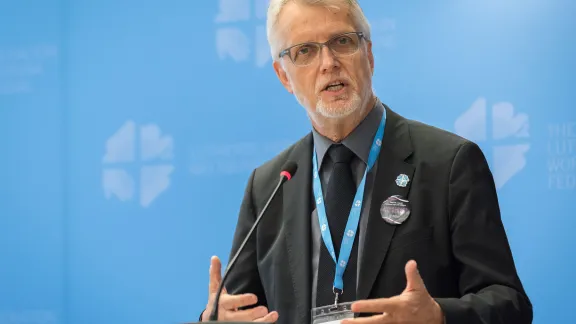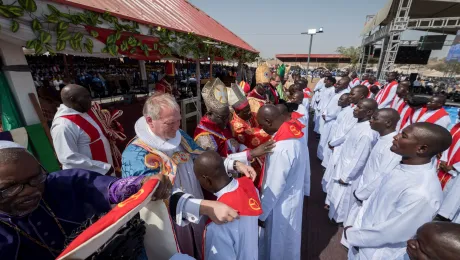
LWF General Secretary Rev. Dr Martin Junge, presents his report to the 2019 Council meeting Photo: LWF/Albin Hillert
Report of LWF General Secretary Rev. Dr Martin Junge to 2019 Council meeting
(LWI) - In a context marked by growing insecurity, fragmentation, disregard for international order and rules, The Lutheran World Federation (LWF) General Secretary Rev. Dr Martin Junge has urged the global communion to be a witness of prophetic defiance that speaks about God’s compassionate and liberating presence.
“We are living in challenging times,” wrote the general secretary in his report. They are characterized by contempt for long agreed-upon frameworks of international law and human rights, a shift to populism, xenophobia and fundamentalism, a backlash against gender justice, and a lack of willingness to address the climate emergency that is upon us, despite urgent calls from young people around the world.
“The space for civil society is shrinking,” he said. In the global south, the LWF has seen “increasing challenges” in reaching people in affected communities, e.g. in Myanmar, and severe threats to human rights defenders in countries such as Colombia. However, he noted that more serious and “destabilizing blows are happening in the global North, with attacks targeting the very foundations of international law and multilateral structures.” The first victims of this change are “people and their rights, particularly minorities.”
The Lutheran communion is addressing these developments through direct action, programs, and reflection. “Our presence and voice as a global communion offers a witness of prophetic defiance, one that speaks about God’s compassionate and liberating presence in our world.”
The communion’s work is dedicated to “bringing change to a 21st century world facing such difficult challenges.” It builds on the new LWF Strategy 2019-2024 and its two priorities, “Supporting churches’ presence and vibrant witness in the world” and “Promoting human dignity, justice and peace.”
Vibrant churches in times of change
Reflecting on visits to LWF member churches, the general secretary remarked that many of them are “facing dramatic change, almost having to re-invent the way they witness.” Some of these churches have been at the center of society, while others have lived and witnessed in minority situations.
Reflecting on these developments he stated: “There is no church ‘dying’. The church is changing. Or must change. If there are things coming to an end, it is because there are new things about to begin,” the general secretary said, adding that “there are encouraging practices being tested, models being discussed. Churches are thinking outside the box to grasp what God is doing new in the church. I see the LWF’s role as helping to better connect the many initiatives, ideas, and experiences, local and regional, that are already in place. There is a big opportunity for cross-fertilization and learning in the communion across regions.”
The general secretary shared news about a global consultation on Lutheran identity taking place in Ethiopia in October. It will explore how the member churches articulate their identity while witnessing in their contexts and launch a new program on Lutheran identity in global and contemporary perspective.
Serving the most vulnerable
The number of refugees and internally displaced people has continued to rise globally, reaching a high point of 68 million in 2018. At the same time resources to meet their needs are decreasing.
The work of LWF’s international diaconal arm reached 2.3 million people in need in 2018, increasing its work in Colombia to meet the needs of refugees from Venezuela and expanding its engagement in Cameroon to serve refugees from the Democratic Republic of Congo.
LWF World Service continues to work in all phases of the development cycle “from emergencies to recovery to long-term development,” always including action to support the development of sustainable livelihoods for vulnerable communities as “a core feature of all programs.” The general secretary expressed his appreciation for the growing cooperation between World Service programs and the churches.
Celebrating an ecumenical milestone
The Council meeting includes a celebration of the 20th anniversary of the Joint Declaration on the Doctrine of Justification (JDDJ), signed by the LWF and Roman Catholic in 1999, and affirmed since by the Methodists, Anglicans and the Reformed. Council members will also receive a 20th anniversary edition of the JDDJ, published by the five signatory communions. “This joint publication is a good indication that we are taking concrete steps as we move together.”
Referring to the 500th anniversary of the Diet of Worms, where Martin Luther defended his teachings, leading to excommunication from the church, Junge said the LWF and Pontifical Council for Promoting Christian Unity have commissioned a study to “shed light on the historic context of the events of the 16th century and trace the ensuing developments since then.”
A gift of faith for the future
“There is no future in the past – that was the basic message for the people of God as they followed God’s call out of Egypt and into freedom,” Junge writes, looking to the work ahead on promoting human dignity, justice and peace. “Our hope shall not focus on the past and thereby idealize slavery, but will dwell on the future, to embrace God’s liberating grace that encompasses all human beings. Hope, as a gift of faith, is the antidote to paralyzing nostalgia.”
Our hope shall not focus on the past and thereby idealize slavery, but will dwell on the future, to embrace God’s liberating grace that encompasses all human beings. Hope, as a gift of faith, is the antidote to paralyzing nostalgia.
The 2019 LWF Council meeting takes place in Geneva from 13 to 18 June. The theme of the Council is “Because we know God’s voice” (John 10:4). The LWF Council meets yearly and is the highest authority of the LWF between assemblies. It consists of the President, the Chairperson of the Finance Committee, and 48 members from LWF member churches in seven regions.


